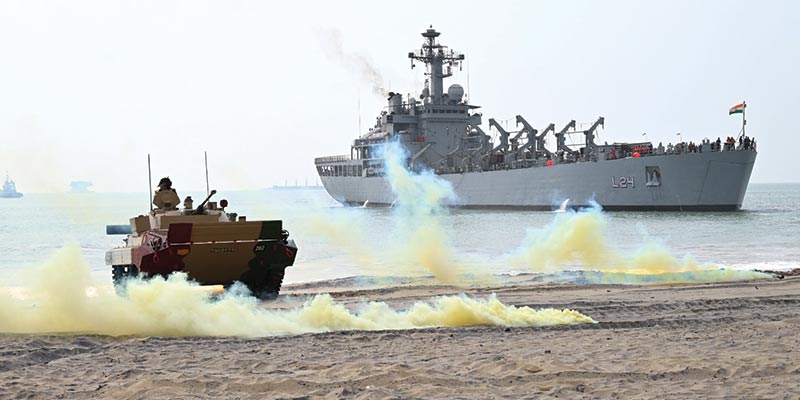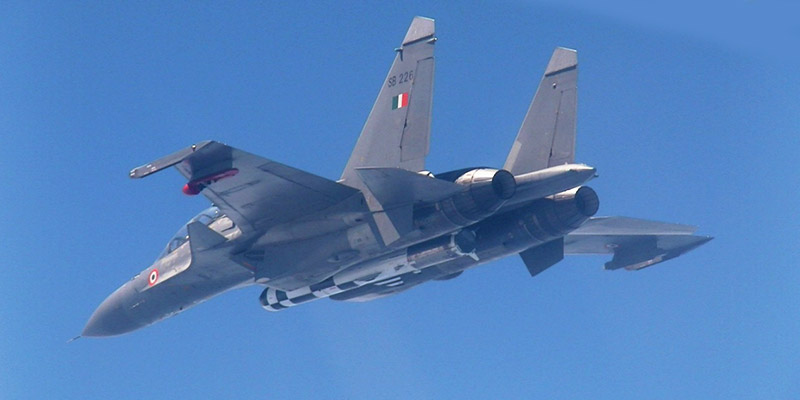- India
- May 13
Tri-Service Act notification sets stage for India’s unified theatre command
• The Inter-Services Organisations (Command, Control and Discipline) Act has been notified in a gazette and it has been enforced with effect from May 10.
• The move comes amid the theaterisation plan envisioned by the government.
• The notification of the Act will pave the way for creation of unified theatre commands.
• Under the theaterisation model, the government seeks to integrate the capabilities of the Army, the Air Force and the Navy, and optimally utilise their resources for wars and operations.
• In order to bolster effective command, control and efficient functioning of Inter-Services Organisations (ISOs), the Bill was passed by both the Houses of Parliament during the Monsoon Session of 2023.
• The Bill received the assent of the President on August 15, 2023.
• The Act empowers Commanders-in-Chief and Officers-in-Command of Inter-Services Organisations to exercise control over service personnel, serving under them, for effective maintenance of discipline and administration, without disturbing the unique service conditions of each individual service.
• With the notification, the Act will empower the heads of Inter-Services Organisations and pave the way for expeditious disposal of cases, avoid multiple proceedings and will be a step towards greater integration and jointness among the Armed Forces personnel.
Why was the Bill introduced?
• Earlier, the service personnel of Air Force, Army and Navy were governed by the provisions of the Air Force Act, 1950, the Army Act, 1950 and the Navy Act, 1957 (the Service Acts) respectively.
• Only officers of the respective services are empowered to exercise disciplinary powers over the service personnel under the respective Service Acts.
• This has a direct impact on command, control and discipline of Inter-Services Organisations like Andaman & Nicobar Command or Defence Space Agency, and joint training establishment like National Defence Academy or National Defence College, as the Commander-in-Chief or Officer-in-Command of such Inter-Services Organisations are not empowered to exercise disciplinary or administrative powers over the personnel belonging to other services.
• As a consequence, the personnel serving in Inter-Services Organisations need to be reverted to their parent Service units for any disciplinary or administrative action.
• This is not only time consuming, but also has financial implications relating to movement of the personnel.
• The problem becomes more cumbersome when the disciplinary or administrative proceedings arise from the same set of facts and circumstances but involve personnel belonging to different services.
• As a result, multiple sets of proceedings under the respective Service Acts are required to be initiated, which impedes expeditious disposal of cases, thereby affecting the standard of discipline.
• There is a need to empower the Commander-in-Chief and Officer-inCommand of the Inter-Services Organisations to exercise control over the service personnel serving under or attached under their command, for maintenance of discipline and proper discharge of their duties,without disturbing the unique service conditions or amending the Service Acts.
• Inter-Services Organisations (Command, Control and Discipline) Bill is an enabling legislation, which empowers the heads of the Inter-Services Organisations to exercise effective command, control and discipline on all personnel of regular Air Force, Army and Navy and to persons of other forces as notified by the central government, who are serving in or attached to an Inter-Services Organisation, without amending the respective Acts.
How theaterisation will be a game-changer?
• The Department of Military Affairs (DMA) is working to promote the culture of theaterisation. The idea is to integrate units of all three services in a single theatre under a common Commander to enhance operational efficiency.
• China did it in 2016, the US and most major militaries had done it a long time ago.
• India has kickstarted the process to set up theatre commands, which involves jointness and integration of the disparate war-fighting units.
• Theaterisation aims to replace the existing functional commands with theatre commands, giving a single commander in a designated zone authority over all the assets and resources of all three services stationed in that particular zone.
• The Inter-Services Organisation (Command, Control and Discipline) Act is a key part of this process.
• India now has 19 commands, including 17 single-service commands based on operational and geographical needs.
• The Army has six operational commands and one training command.
• The IAF has five operational commands, a training command and a maintenance command.
• The Navy has three commands.
• Then there are two additional commands — the tri-services command located at the Andaman & Nicobar Islands and the Strategic Forces Command.
• In the eventuality of an all-out conflict with China, at least seven commands will be involved in defensive and offensive operations. On the other hand, China’s western theatre command alone will be taking on Indian forces.
• Theaterisation of military commands was not a foreign idea for Indian forces. It first came about in the aftermath of the Kargil conflict when Indian soldiers were sent out to expel intruders comprising Pakistani soldiers and irregulars perched on the icy heights of Tiger Hills, Tololing Ridge and other dominating features that overlooked National Highway number 1 in Ladakh.
• The theaterisation idea gained traction in the Kargil Review Committee set up in 2000, and it received a further boost in the form of a recommendation in the Group of Ministers’ report (2001) on Kargil. The report envisaged a joint command in the place of the existing Andaman & Nicobar Command as the “crucible for future joint commands”, similar to theatre commands.
• In 2005, the discussion on theatre commands was started by the Headquarters Integrated Defence Staff when Admiral Arun Prakash was the chairman of the chiefs of staff committee.
• In response to the 73-day-long Doklam standoff with China (2017), India had undertaken a massive exercise called ‘Himvijay’ in October 2019. It had a few elements resembling theaterisation.
• On December 30, 2019, the government appointed Gen Bipin Rawat as India’s first Chief of Defence Staff (CDS) with a mandate to bring in convergence in the functioning of the Army, Navy and the Air Force and bolster the country’s military prowess.
• The theaterisation plan suffered a blow with the sudden demise of Gen Rawat in a helicopter crash on December 8, 2021. The crucial post of the CDS remained vacant for about ten months until the appointment of General Anil Chauhan on September 30, 2022.
• In June 2020, a total of 20 Indian soldiers were killed in Ladakh’s Galwan Valley in a violent face-off between the armies of India and China in eastern Ladakh. This incident provided a push to the theaterisation process.
• While the final definitive contours of the theaterisation architecture is yet to be finalised, various models are already being discussed.
• Defence Minister Rajnath Singh had said that the theaterisation process in the military is making progress, with consensus emerging among the three services on the ambitious initiative.
Manorama Yearbook app is now available on Google Play Store and iOS App Store



